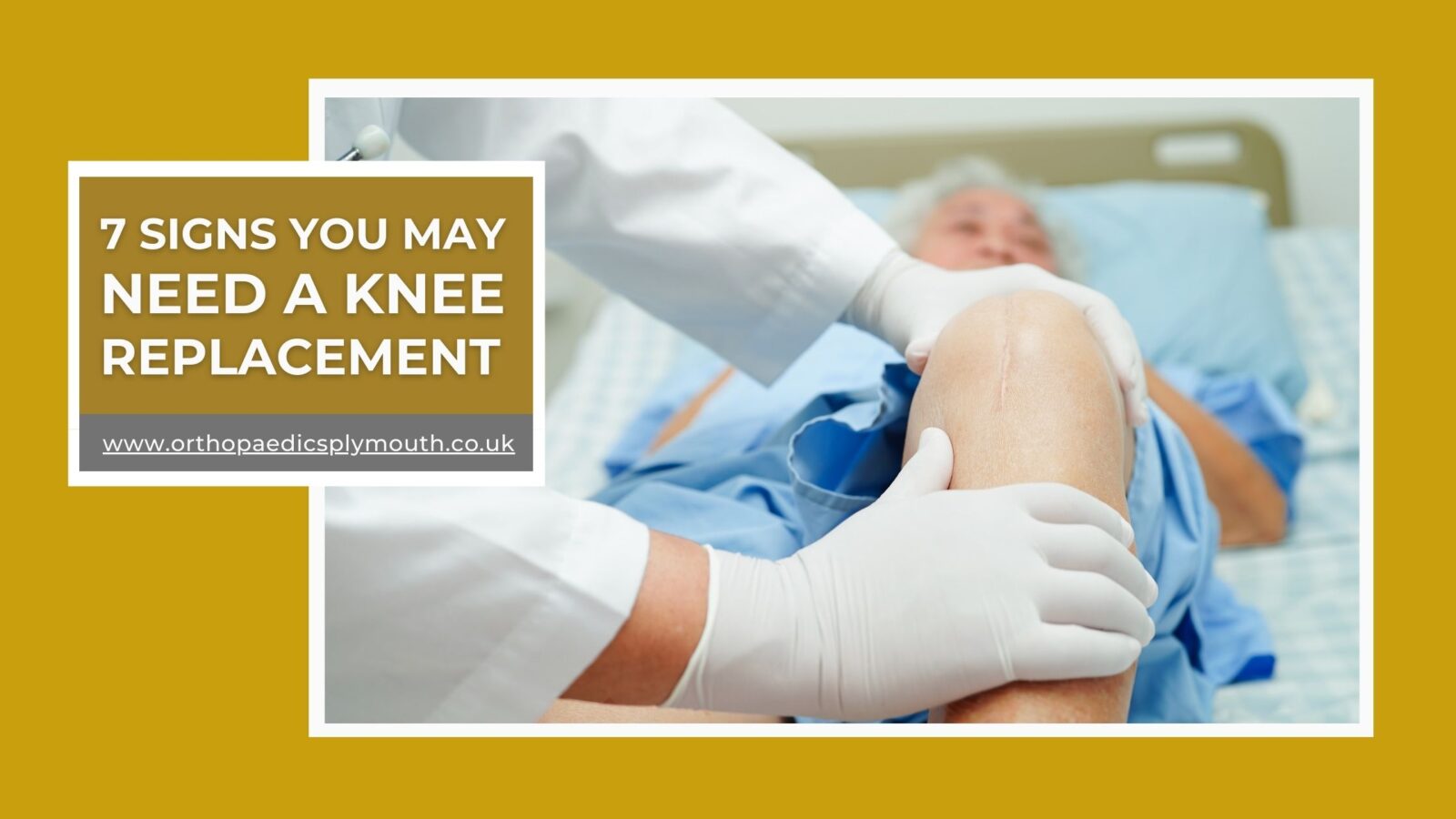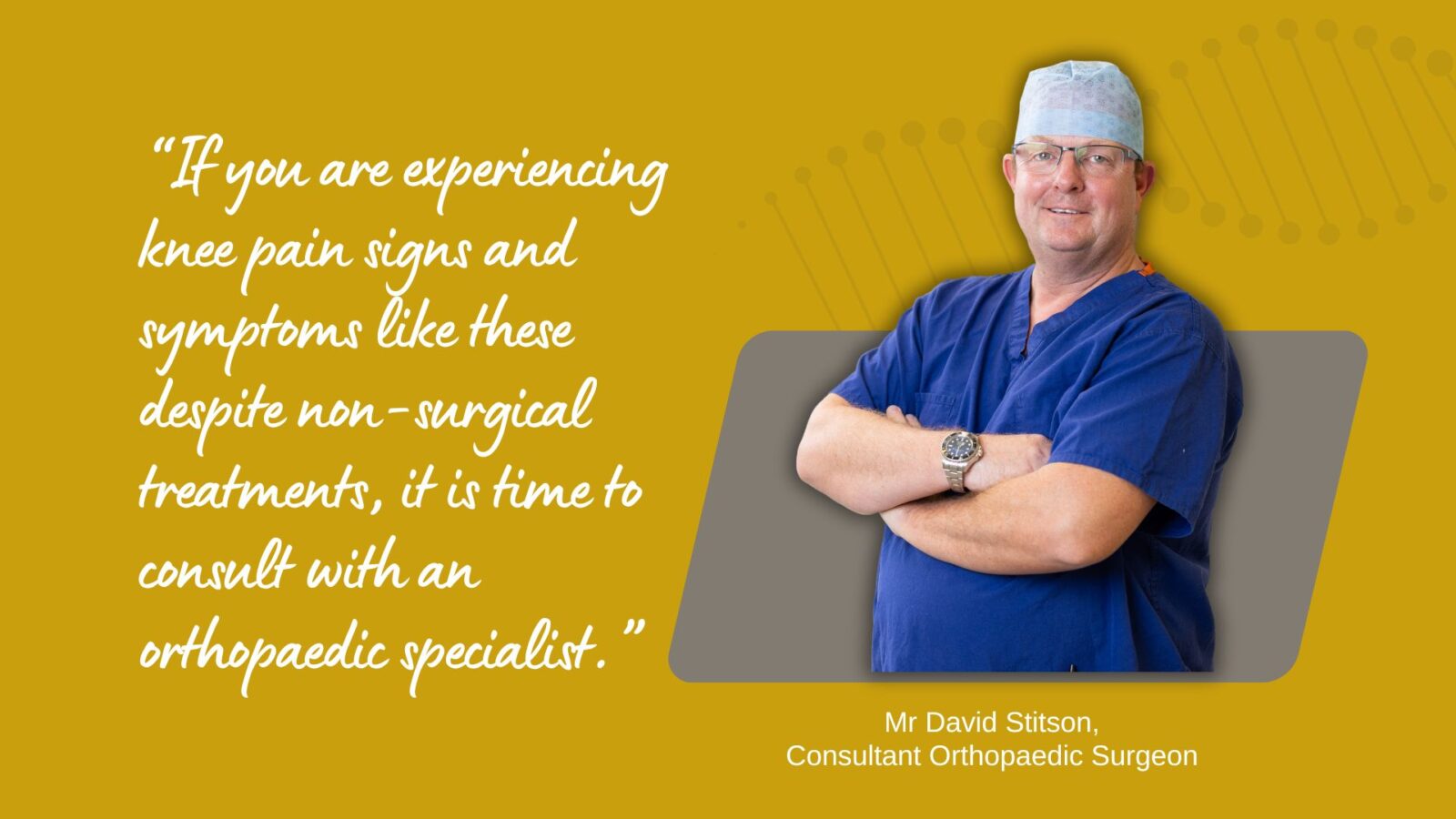Are you currently experiencing knee pain?
Do you feel like you are stuck living with chronic knee pain forever?
As the second most common cause of chronic pain, many people deal with knee pain at some point in their life or another. So, you aren’t alone if you answered yes to either question.
Contents
ToggleHowever, most knee pain doesn’t last too long for many people. After a few days of rest, paired with anti-inflammatory medications, the pain usually disappears, and they can get back to their daily activities.
But what happens when nothing seems to alleviate your knee pain and it persists for months at a time and every move – including walking, going upstairs, or sitting down — can be painful?
When knee pain persists for months despite various attempts to alleviate it, and everyday activities become painful, it could indicate a serious underlying issue that may require medical intervention, such as knee replacement surgery.
Here are 7 Signs you may need a knee replacement:
1. Chronic Knee Pain:
Persistent and severe pain in the knee, even at rest, can be a sign that the joint is severely damaged or degenerated.
2. Limited Mobility:
Difficulty in performing daily activities like walking, climbing stairs, or even standing for extended periods due to pain and stiffness in the knee.
3. Knee Swelling and Inflammation:
Persistent swelling and inflammation around the knee joint that does not respond to rest, ice, or medication.
4. Joint Stiffness:
Stiffness in the knee limits movement and flexibility, making it challenging to bend or straighten the leg fully.
5. Joint Deformity:
Visible deformity of the knee joint, such as bowing in or out of the leg may indicate advanced degenerative change in the joint.
6. No Improvement with Conservative Treatments:
Lack of improvement in symptoms despite trying conservative treatments such as physiotherapy, medication, injections and lifestyle modifications.
7. Impact on Quality of Life:
Knee pain may significantly affect your quality of life, cause difficulty performing routine tasks, impair your ability to participate in recreational activities and also cause sleep disturbance.
Suppose that you are experiencing knee pain signs and symptoms like these mentioned above despite non-surgical treatments. In that case, it is time to consult with an orthopaedic specialist such as Mr Stitson, who will evaluate your condition, arrange for diagnostic tests such as X-rays or scans and determine whether knee replacement surgery is the appropriate course of action for you.
Below are the answers to some common questions asked by knee replacement patients:
Total Knee Replacement FAQs
How do I know if I need a knee joint replaced? Determining whether you need a knee replacement is based on several factors, including your level of pain, mobility limitations and the impact of these issues on your quality of life.
How bad does my knee have to be before a replacement is considered?
The decision to undergo knee replacement surgery is based on several factors, including the severity of your knee pain, the extent of joint damage and the impact of your symptoms on your quality of life. There isn’t a specific threshold of pain or damage that universally determines when knee replacement surgery is necessary, as each person’s situation is unique. However, there are some general guidelines that Mr Stitson will consider when evaluating whether you are a candidate for knee replacement:
- The severity of symptoms:
If your knee pain significantly affects your ability to perform daily activities, such as walking, climbing stairs, or getting up from a chair and if conservative treatments have failed to provide relief, surgery may be indicated.
- Joint damage:
Imaging tests, such as X-rays or MRI scans, can help assess the extent of joint damage, including cartilage loss, bone spurs, and deformities. Severe joint damage resulting from advanced osteoarthritis or rheumatoid arthritis may indicate the need for knee replacement surgery.
- Your ability to maintain an active lifestyle:
If knee pain and stiffness interfere with your ability to maintain an active lifestyle or participate in activities you enjoy, Mr Stitson may recommend surgery to restore function and improve mobility.
Ultimately, the decision to undergo knee replacement surgery is made collaboratively between you and your orthopaedic surgeon. Mr Stitson will evaluate your circumstances, discuss the risks and benefits of knee surgery and consider your preferences and goals before recommending a treatment plan.
What is the average age for knee replacement?
Most total knee replacements are carried out on people between the ages of 60 and 80. Some, however, are younger and may also be older than this. Apart from age, your general health will need to be good enough to cope with what is a major operation and with the rehabilitation afterwards.
How long does a knee replacement last?
85% to 90% of total knee replacements can be expected to last 20 years or more. After recovery, you can engage in various low-impact activities, such as walking, swimming, golfing, or biking.
What is the recovery time for a knee replacement?
Following Total Knee Replacement most patients leave the hospital within 1 to 2 days. You will use walking aids such as crutches for up to 6 weeks but should be able to take care of yourself by the time you get home. Patients can expect to start resuming most activities from 6-weeks after surgery.
Most of your pain and swelling should be gone within 3-months of surgery. However, you may still have some discomfort with activities such as going up and down stairs or sitting in one position for too long for a little longer. It is important to remain physically active, maintain a healthy weight and follow physiotherapy advice to achieve the best recovery.
About Knee Surgery
Knee replacement surgery replaces the worn out, painful and stiff knee joint with a new prosthetic joint. This procedure which may be a partial or a total replacement is normally performed under spinal anaesthesia and is usually followed by a night or two in the hospital. Day-case knee replacement surgery may be an appropriate option for you.

About Mr Stitson
David Stitson is a Plymouth-based Consultant Trauma and Orthopaedic Surgeon. Trained both in the UK and internationally, he has worked in medicine for more than 20 years for the NHS, for the Royal Air Force and in private practice. Mr Stitson operates privately at the Nuffield Health Hospital, Plymouth.

The Nuffield Plymouth CQC Rating
The Nuffield Hospital has a history that spans over half a century and has built a reputation for high standards of care, professionalism and expertise in delivering health services. They aim for continuous quality improvement in everything they do.
Active Quality and Governance programmes are in place at the Nuffield Hospital Plymouth. As part of this, the hospital is inspected by independent healthcare regulators to ensure it meets the fundamental standards of quality and safety as determined by the regulating body (CQC).
In the most recent inspection, Plymouth Nuffield Hospital was rated as ‘Good’ overall, however, the surgical element of the inspection was rated as ‘Outstanding’. The hospital was referred to as:
“Outstanding in effective and caring, and
Good in safe, responsive and well-led.”





